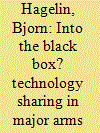| Srl | Item |
| 1 |
ID:
113114


|
|
|
|
|
| Publication |
2012.
|
| Summary/Abstract |
From the recipients' perspective, arms transfers have, through the use of offsets, technology transfers, and industrial participation, become an opportunity to receive not only advanced weapons, but also technologies not otherwise available. How important are friendly relations for securing a military export order? To what extent do buyers demand advanced military or commercial technology and how are these demands accepted by the supplier? How does this influence smaller producers in relation to major producers? These questions are addressed by studying (a) the Joint Strike Fighter/F-35 by Lockheed Martin, USA, and the JAS-39 Gripen aircraft by Saab, Sweden, (b) the Medium Multi-Role Combat Aircraft competition in India for 126 combat aircraft, and (c) the Indian offset policy. In the final section, some long-term consequences are discussed.
|
|
|
|
|
|
|
|
|
|
|
|
|
|
|
|
| 2 |
ID:
098423


|
|
|
|
|
| Publication |
2009.
|
| Summary/Abstract |
The national research and development (R&D) base has in the post-cold war era gained increased importance in order to fill new security demands. There is a broadening of the search for security relevant science and technology involving more organizations and interests, scientific disciplines and nations. The question discussed in this article is if the premises of international, free and open R&D will be(come) compromised? Will we see more scientists, in their normal scientific activities, being accused of spying? The article suggests that such risks are not unrealistic to expect. Spy cases in less democratic countries could have consequences for scientists also in other countries. Outcomes depend on, among other things, the relative strengths of academic freedom and a political Identification Friend and Foe (IFF) component. United Nations and European Union resolutions restricting science education for students from Iran and North Korea in an attempt to prevent the spread of nuclear weapons illustrate a strong IFF component. Difficulties with regard to the implementation of these resolutions and other findings are presented in the final section of the article.
|
|
|
|
|
|
|
|
|
|
|
|
|
|
|
|